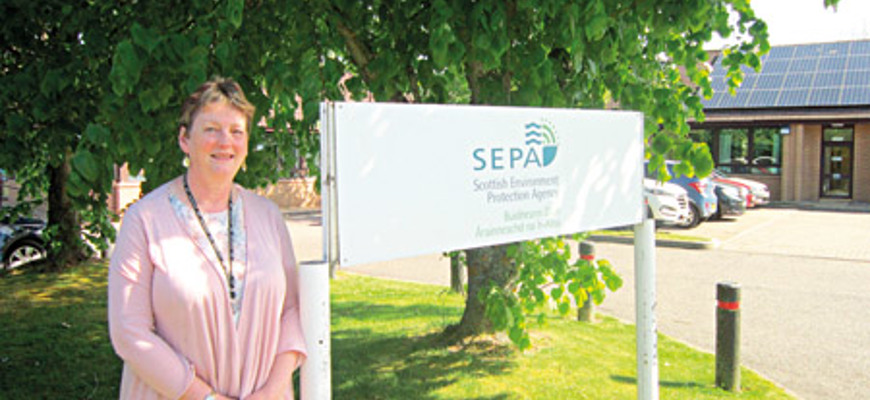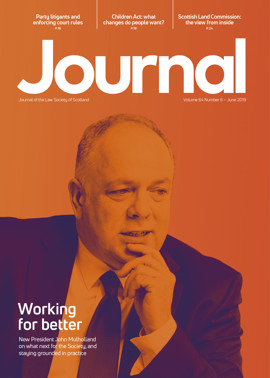About a planet

Where do you come from and what was your career path to your current position?
I was born in Carlisle, but my parents moved back across the border when I was young and I was brought up just outside Edinburgh and went to university in Aberdeen. I started my career as an in-house trainee with (and this is showing my age!) the North of Scotland Hydro Electric Board. I then moved into private practice and spent the next few years doing commercial property work – with a slight detour via a secondment into the University of Edinburgh’s industrial liaison company doing contracts and IP work – in firms in Edinburgh, Inverness and Glasgow. In 2002, I was living in Inverness and working in-house for Highlands & Islands Enterprise (HIE), our local enterprise company. However I had always been interested in environmental law and when the opportunity came up to join SEPA and be based in our office in Dingwall, just north of Inverness, I seized it.
How is your in-house legal team structured?
SEPA has two legal teams. Corporate Legal Services provide SEPA with a range of commercial and corporate legal advice. My team, the Compliance & Beyond Legal Team, provides advice on environmental law and regulation across SEPA and is currently divided into two regional teams and another which has a national role. There are 20 people in our team with a mixture of full-time and part-time staff, based in Edinburgh, Dingwall and our office at Eurocentral, near Glasgow.
The team provides legal advice to allow SEPA to take informed decisions on managing legal risk arising from the performance of its regulatory functions, particularly in relation to enforcement activities, the interpretation of legislation and the implementation of new legislation. We also support SEPA in defending appeals or other legal challenges against its regulatory decisions.
What is a typical working day? What motivates you on a Monday morning?
I think any solicitor in SEPA will tell you that there is no such thing as a “typical working day”! By its nature, a lot of the work we do is reactive, so although I always come into work with a plan, it may go by the board once I have checked my inbox and messages. I give advice primarily in the area of waste law and recently I have been involved in advising on issues such as preventing suspected unlawful export of waste and the regulation of waste tyre sites. I have also been assisting policy colleagues who are involved in the development of the new deposit return scheme for drinks containers that was recently announced by the Scottish Government. SEPA is creating a world-class environment protection agency, grounding our regulation and activities across whole sectors. This sectoral approach is aimed at helping those we regulate operate successfully within the means of one planet. Over the past year, the legal team has been involved in the development of plans for each sector and the first batch of these has now been published.
The first thing which motivates me on a Monday morning is the need to organise my daughter to get ready for school – SEPA offers very good, flexible working conditions which are great for maintaining that all-important work-life balance. But what motivates me to come to work every day is being part of a team which works with colleagues across SEPA to make sure that the environment and human health are protected and to ensure that Scotland’s natural resources are used as sustainably
as possible.
What was the biggest change for you when you moved in-house? What do you really enjoy about working in-house?
My first move in-house (to HIE) wasn’t a huge change. I had previously worked for firms who were contracted to do commercial work for the organisation, so I already knew that business and had built up relationships with colleagues. Moving to SEPA, on the other hand, involved a steep learning curve. I had to get up to speed with a new, varied and complex area of law – up to that point my interaction with environmental law had largely been in the area of discharges from septic tanks, so being thrown into advising on the regulation of marine cage fish farms or waste management sites was quite daunting. At the same time, I had to build up relationships with colleagues in the legal team and from other disciplines, many of whom are very experienced and knowledgeable in their particular fields.
However, those same challenges are the reason why I really enjoy working in-house at SEPA. Over my time here, environmental law has developed and keeps developing. And the issues we have to address are developing too, so we have to be innovative and creative in the way we use our statutory powers to address those issues.
Has SEPA experienced any major change recently? What are the current hot legal topics for your organisation?
In the last few years we have seen a sea change in the way SEPA approaches its regulatory role. We have a new regulatory strategy – One Planet Prosperity – aimed at creating transformative changes that reduce Scotland’s use of resources, as we know that we currently use the resources of three planets when we only have one. This is underpinned by our statutory purpose – as set out in the Regulatory Reform (Scotland) Act 2014 – to protect and improve the environment in ways that create economic and social success. The Act provided SEPA with new enforcement tools, and we are now able to serve fixed and variable monetary penalties and to agree enforcement undertakings with businesses. Developing the use of these new tools is just one example of the innovative legal work that solicitors in SEPA are currently involved in. We are also moving towards an integrated authorisation framework (one authorisation for a site rather than multiple permits), and the legal team have been closely involved in implementing that change.
What makes a good in-house lawyer, and for SEPA in particular?
Obviously you need strong legal technical skills, but that doesn’t mean that you need to have huge amounts of environmental law experience to join us. We look for lawyers with transferable skills and experience, whether these have been gained in-house or in private practice. A good SEPA lawyer has to be a great communicator and able to translate complex law into plain English. You also need to be able to work as part of a multidisciplinary team and to be pragmatic and flexible. I think that a key part of the role is being able to think creatively in terms of finding solutions to difficult or novel regulatory matters. And a sense of humour is a definite advantage!
What are you and your team’s key challenges in the coming year?
SEPA is currently in the process of moving from a regional structure to a functional structure. The restructure will impact the way in which our legal team works. This will be more flexible and will give members of the team the opportunity to identify areas in which they wish to develop and gain expertise. So the key challenge for us as a team is to manage that transition while continuing to deliver a great service for the organisation.
What has your team done that is innovative?
I think you would have to come back and ask me that next year – by then our transition to the new functional, flexible way of delivering our service using virtual teams will be complete. We are currently collaborating on the tools we need to facilitate this change.
What keeps you busy outside the office?
Family life! Like most parents, I feel as if I have a second job as taxi driver as I shuttle my daughter from one place to another. However we are very fortunate that we live in a beautiful part of Scotland with lots of green space right on our doorstep. So I try to make sure we spend as much time outside as possible, walking the dog and riding bikes. I am also a director of our local community woodland charity and at the moment we are trying to organise a family tree-planting day. SEPA gives us one day’s paid volunteer leave every year to encourage us to take part in volunteering activities.
What would you take with you to a desert island? What would you put in Room 101?
I love to read, so an unlimited supply of books would definitely be my desert island pick. But if I had to choose one only, it would be Pride and Prejudice. Or it could be Narrow Dog to Carcassone, or The Lost Words – Spell Songs (my daughter’s current favourite) or, or… it’s an impossible choice to pick only one!
Room 101 – all the plastic floating around in the world’s rivers and oceans (for obvious reasons).
Perspectives
Features
Briefings
In practice
- Tradecraft – one solicitor's experience
- Dear employer...
- Team building – for the Foundation?
- Accredited paralegal practice area highlight: conveyancing
- Accredited Paralegal Committee profile
- What's new for paralegals?
- Ask Ash
- Managing the risk of workplace stress
- Appreciation: Iain Alexander Macmillan
- Revealed – by your AML certificates






